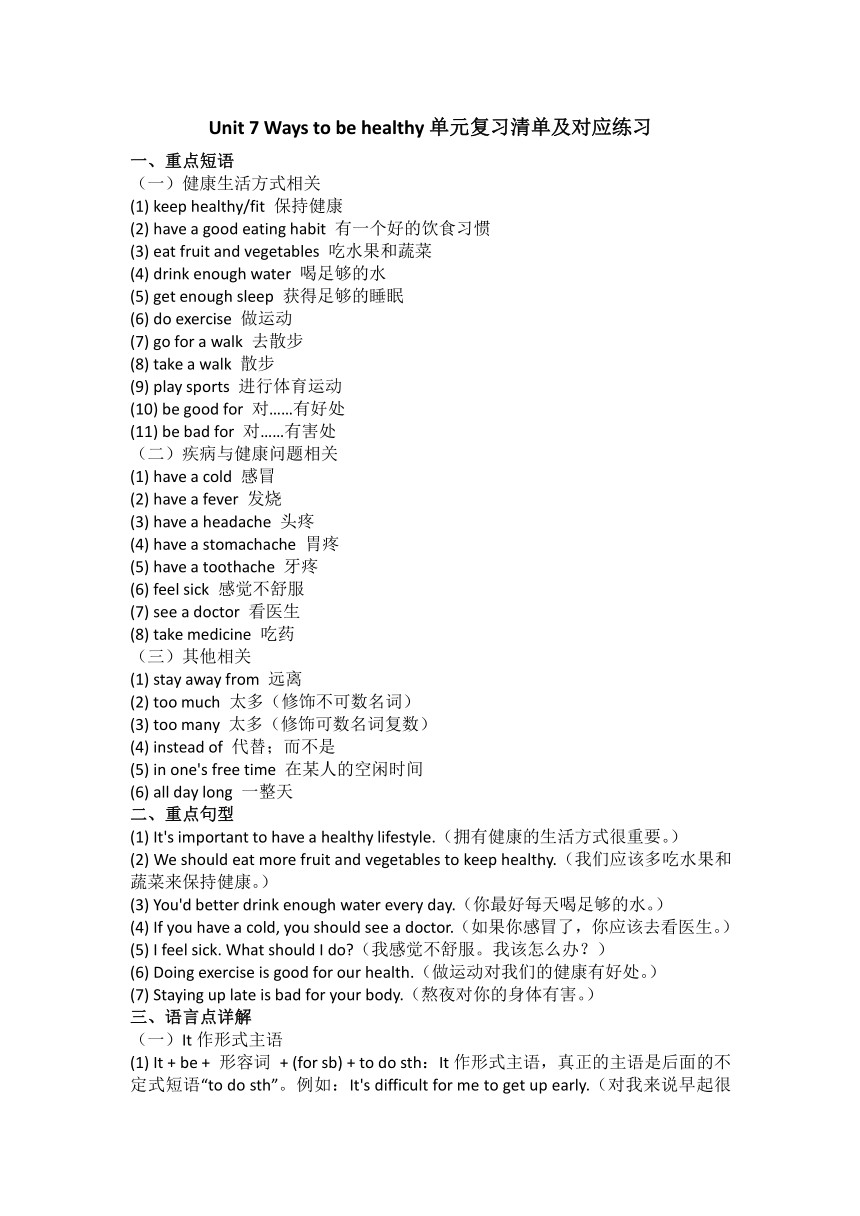
Unit 7 Ways to be healthy单元复习清单及对应练习 一、重点短语 (一)健康生活方式相关 (1) keep healthy/fit 保持健康 (2) have a good eating habit 有一个好的饮食习惯 (3) eat fruit and vegetables 吃水果和蔬菜 (4) drink enough water 喝足够的水 (5) get enough sleep 获得足够的睡眠 (6) do exercise 做运动 (7) go for a walk 去散步 (8) take a walk 散步 (9) play sports 进行体育运动 (10) be good for 对……有好处 (11) be bad for 对……有害处 (二)疾病与健康问题相关 (1) have a cold 感冒 (2) have a fever 发烧 (3) have a headache 头疼 (4) have a stomachache 胃疼 (5) have a toothache 牙疼 (6) feel sick 感觉不舒服 (7) see a doctor 看医生 (8) take medicine 吃药 (三)其他相关 (1) stay away from 远离 (2) too much 太多(修饰不可数名词) (3) too many 太多(修饰可数名词复数) (4) instead of 代替;而不是 (5) in one's free time 在某人的空闲时间 (6) all day long 一整天 二、重点句型 (1) It's important to have a healthy lifestyle.(拥有健康的生活方式很重要。) (2) We should eat more fruit and vegetables to keep healthy.(我们应该多吃水果和蔬菜来保持健康。) (3) You'd better drink enough water every day.(你最好每天喝足够的水。) (4) If you have a cold, you should see a doctor.(如果你感冒了,你应该去看医生。) (5) I feel sick. What should I do (我感觉不舒服。我该怎么办?) (6) Doing exercise is good for our health.(做运动对我们的健康有好处。) (7) Staying up late is bad for your body.(熬夜对你的身体有害。) 三、语言点详解 (一)It作形式主语 (1) It + be + 形容词 + (for sb) + to do sth:It作形式主语,真正的主语是后面的不定式短语“to do sth”。例如:It's difficult for me to get up early.(对我来说早起很难。) (二)should的用法 (1) should为情态动词,意为“应该”,后接动词原形。其否定形式为shouldn't,意为“不应该”。例如:We should study hard.(我们应该努力学习。)You shouldn't eat too much junk food.(你不应该吃太多垃圾食品。) (三)had better的用法 (1) had better意为“最好”,后接动词原形,其否定形式为had better not。例如:You had better go home now.(你现在最好回家。)We had better not play games too long.(我们最好不要玩太长时间游戏。) (四)动名词作主语 (1) 动名词(动词 -ing形式)可以作主语,谓语动词用单数形式。例如:Reading books is interesting.(读书很有趣。)Swimming is a good sport.(游泳是一项很好的运动。) (五)too much、too many和much too的区别 (1) too much:意为“太多”,修饰不可数名词。例如:There is too much water in the glass.(杯子里有太多水。) (2) too many:意为“太多”,修饰可数名词复数。例如:There are too many people in the park.(公园里有太多人。) (3) much too:意为“太”,修饰形容词或副词。例如:It's much too hot today.(今天太热了。) (六)instead和instead of的用法 (1) instead:副词,意为“代替;反而”,通常位于句末。例如:He didn't go to school. Instead, he stayed at home.(他没去上学。相反,他待在家里。) (2) instead of:介词短语,意为“代替;而不是”,后接名词、代词或动名词。例如:I will go shopping instead of watching TV.(我将去购物而不是看电视。) 四、语法聚焦 (一)情态动词should (1) should表示建议、劝告、责任等,没有人称和数的变化,后接动 ... ...
~~ 您好,已阅读到文档的结尾了 ~~